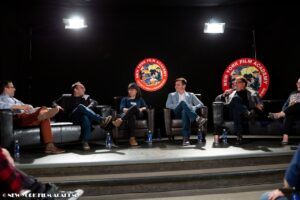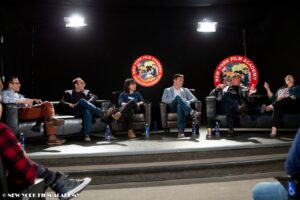On Thursday, February 20, New York Film Academy (NYFA) had the pleasure to host The Creators Society in a panel of both creators and development executives sharing their expertise on developing an animated series. Mike Blum, founder of Pipsqueak Animation, moderated the event.
The Creators Society is a group of passionate, like-minded members of the animation community who work in the fields of film, TV, commercials, visual effects, VR/AR, and gaming. Last week’s panel included: writer, creator, and story editor, Emily Brundige; Executive Producer on Jim Henson’s Splash and Bubbles, Michael Shawn Lewis; Cartoon Network’s Vice President of Development, Nicole Rivera; Executive Producer, President, and Co-Chairman of Yeti Farm Creative, Frank Saperstein; and Sr. Director, Animation Development at Nickelodeon, Daniel Wineman.
After sharing their career trajectories, Blum opened up the Q&A by asking, “How do you know if you have a good idea? What is the difference between a good idea and a sellable idea?”
Brundige shared, “I only decide to develop an idea into a show if it has legs to generate lots of stories. If the character can drive plenty of stories or if the show concept creates an engine where you can see lots of stories generating, that’s how I know I’ll have something there.”
When asked about the best way to decipher what ideas the market wants, Saperstein advised, “The best advice I can give to a newcomer is not only know your audience in terms of who your ultimate audience is, but know the audience you’re going into a meeting and pitching for.”
To that point, Rivera added, “If you’re not sure what people want, you can always ask for a general meeting before you share all your ideas, because everyone is evolving and looking for different things, so making that connection and vibing before you pitch something is really helpful.”
Speaking to the development executives in the room, Blum asked, “What for you are the elements that separate a good idea from an okay idea?”
Rivera began by stating, “Definitely character–a character or relationship that feels really specific and can lend itself to lots of comedy and conflict coming from these characters being together, regardless of the world or situation. Then, a world or situation that feels very special will be an additive to those characters.”
Lewis chimed in, “From the creative side, when I’m playing with my show and my world and my characters, I feel like there’s a connection that is genuinely mine. I’m not trying to pretend that my character is expressing something that isn’t me. Finding that character–whatever that may be for you–if it’s genuinely yours, that is so much more interesting to watch.”
Blum then opened up the Q&A to questions from the audience. One attendee asked, “Has there ever been a moment during a pitch when you notice that you’re starting to lose the interest of the executives, and what did you do to reel them back in and salvage something that may not be going the way you want it to go?”
Brundige responded, “Sometimes you or your idea just aren’t a good fit for whoever you’re pitching to, but I’ll usually just try to keep it brief if I feel it’s not going well. However, if you feel like there is something that they’re responding to, such as a character or just something they really laughed at, then you can riff more on that thing and just follow their lead.”
New York Film Academy thanks The Creators Society for joining us and sharing their expertise with our students.


